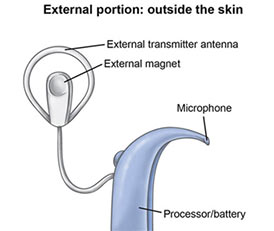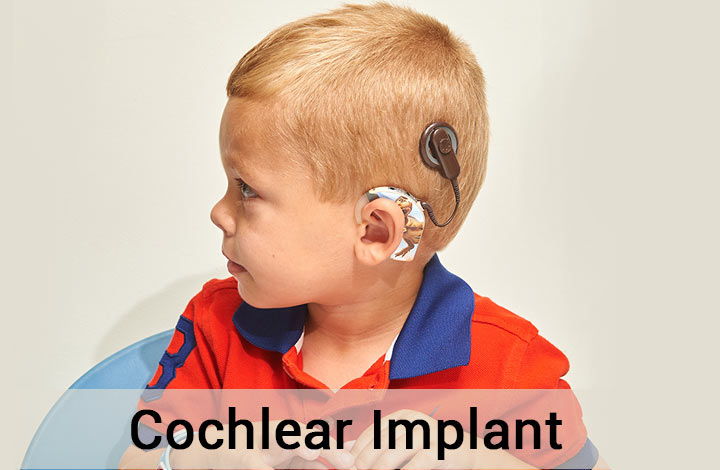Hearing Loss:
before we start about Cochlear Implant In India we are going to know about Hearing loss and also referred as hearing impairment, can be total or partial inability to hear. A deaf person may have little hearing to no hearing. Hearing loss may occur in one or both ears. In children hearing issues can affect the ability to learn spoken language and in adults it can cause work related difficulties. In some people, particularly older people, hearing loss can result in loneliness. It can be temporary or permanent.

The reasons for causing hearing loss can be exposure to noise, genetics, ageing, birth complications, trauma to the ear, some infections, and certain medications or toxins. A commonly found condition which results in hearing loss is chronic ear infections. Certain infections caused during pregnancy such as syphilis and rubella may also result in hearing loss in the child. All newborns are recommended to do Testing for poor hearing. Hearing loss can be characterized as mild, moderate, moderate-severe, severe, or profound. Hearing loss is differentiated in three main types, conductive hearing loss, sensorineural hearing loss, and mixed hearing loss.
Cochlear Implant In India
How Cochlear implant works: A cochlear implant works with the help of two main components: first, this is an external part that hooks over the ear and second one which is a surgically implanted internal part. These two components are combined with the help of a powerful magnet.
The external part of a cochlear implant carries a microphone, a speech processor and a transmitter. The microphone and speech processor are kept in a small unit that looks like a behind-the-ear hearing aid. A small wire usually connects them to the transmitter, which is localized over the internal part of Implant. The microphone catches up acoustic sounds and precedes it to the speech processor. The processor analyses and digitizes the signal before directing further it to the transmitter. The transmitter then codes the signals and sends them to the implanted receiver via the magnetic coupling.

The internal part of implant contains a receiver, which is placed under the skin on the temporal bone, and one or more electrode arrays. The receiver accepts the signals from the transmitter and switches them to electrical pulses. It then sends the pulses to the electrodes which have been implanted deeply into the inner ear. These electrodes directly stimulate the auditory nerve throughout a portion of the cochlea and the brain then interprets these signals as sound.
To know about a possible cochlear implant candidate, person should consult with an ENT physician or an audiologist for a medical evaluation. Where, the patient would need to undergo audiological and psychological testing, a medical exam and imaging studies to investigate if they may benefit from a cochlear implant. There will also be therapy for the candidate, to make sure he or she – or parents, for a child – understand the large follow-up commitment required after the implant surgery, as well as what to expect regarding device performance and limitations.
After a child or adult is considered as viable candidate, he or she will undergo the cochlear implantation surgery, which would be done under general anaesthesia. The surgery takes around two and four hours, after surgery overnight stay is recommended. Post discharge, the person would not be able to hear yet. Although the internal components have been placed, the surgical site must heal before the external device is placed.

The external device part of the cochlear implant if fitted about four to six weeks post-surgery. The activation of the implant is done by the audiologist and the process of mapping the processor is done depending on patient’s requirement. After the activation of the device patient will experience the sounds for the first time which is very emotional moment for any patient or parent.
Why MedicoExperts?
At MedicoExperts, we understand the significance of your health, well-being and privacy. Our aim is to provide you the best experience for your Cochlear Implant surgery in India at our top associate hospitals in India. We understand that while you choose to travel abroad for your cochlear implant surgery, you would surely look for cost savings. And that is why we have special negotiated prices for Cochlear Implantation surgery for you and offering you best possible prices for the top quality of medical services. We would also provide you end to end assistance for your medical trip to India and shall provide complete solution for you Cochlear Implant surgery – right from assisting you with the visa, hotel arrangements, airport pick up and drop, inland transfers, money exchange or sight-seeing and all other concierge services. We thus assure you hassle-free arrangements for evaluations, surgery, recuperation, stay and travel in India.
For more information and getting a tailor made treatment plan for your Cochlear implant surgery in India, please mail us your details and medical history at [email protected].




